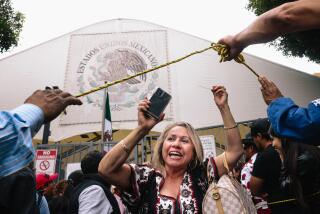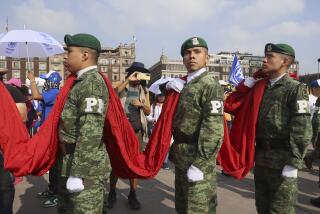Chechens Cast Ballots for President
- Share via
GROZNY, Russia — Sensing freedom after two centuries of rule by Moscow, Chechens flocked to the polls Monday to vote in elections that they hope will confirm the end of the war that Russia waged against their separatist leaders for almost two years and that would bring independence one step closer.
Donning their best but threadbare clothes, the people of this tiny Muslim region turned their day of decision-making into a party. Enthusiasm for the presidential and parliamentary vote was so intense that polling stations stayed open for two extra hours in the evening to cope with the long lines of eager citizens waiting to cast their ballots.
Tens of thousands ignored a fierce frost and clustered excitedly for hours at polling stations in Chechnya’s half-ruined villages and devastated capital, Grozny, talking about the first hope they have had in years for a better future.
“What I hope above all else is that after these elections there will be no more war,” said Lyalya Gazgireveva, a widow from Grozny. She wants enough stability to bring her two refugee daughters home from abroad. “God willing, we will finally be able to put all the horror of the last few years behind us and get on with living again.”
The elections are the first stage in a peace deal reached with Moscow in August, after Chechen separatists humiliated Russia’s army on the battlefield. Moscow was forced to promise to reconsider Chechnya’s claims to independence after five years--and once a government is at work in the devastated region.
But whether the elections bring peace depends largely on which of the two front-running presidential candidates the people of Chechnya choose: Aslan Maskhadov, the separatist commander who made peace; or Shamil Basayev, the most daring and famous of the commanders who made war. Fourteen others are also vying for the post.
Straw polls in different parts of Chechnya on Monday suggested that Maskhadov was well ahead, despite an energetic campaign in the last two weeks by the charismatic Basayev, 32, whose appeal is to the young, romantic and reckless.
“Maskhadov is the only reasonable choice. He can talk to the Russians. He’s moderate and wise. Of course I’m voting for him,” said Ruslan, an unemployed man in the relatively undamaged town of Noviye Atagi, a Maskhadov stronghold.
In the absence of pro-Russian candidates, Russia has made clear that it will swallow its pride and accept Maskhadov as president of Chechnya. It regards a vote for the former Soviet army colonel a vote for peace, with the tricky issue of Chechen secession left on the back burner and perhaps forgotten altogether.
But Russian politicians, still smarting at the blows dealt to their army by the tiny Chechen fighting force, are dead set against Basayev. He is wanted by the Russian police--although he is a hero to Chechens--for a 1995 armed raid into southern Russia that first forced Moscow to negotiate.
Basayev, whose namesake was a Muslim mountain fighter who led resistance to the Russian czars and Cossacks for much of last century, strikes terror into Russian hearts. A controversial suggestion in Russian political circles last week that modern descendants of the czarist Cossack brigades be armed to fight the Chechens has given his name still more historical resonance.
“I cannot imagine how we could deal with an international terrorist like Shamil Basayev, who has so much blood on his hands,” Russian parliament Speaker Gennady N. Seleznyov told Interfax news agency, adding optimistically that the other candidates’ demands for independence “do not amount to more than campaign rhetoric.”
Echoing the somber Moscow mood, Communist Party leader Gennady A. Zyuganov voiced fears that the Chechen elections were not legitimate because hundreds of thousands of refugees who fled their homes and settled abroad during the war would not get a chance to vote unless they came home.
This fear has been widely circulated in Moscow in recent weeks by politicians who could reject the results of voting if a candidate the Russians cannot work with wins.
But about 600 vehicles filled with ethnic Chechens poured back over the eastern border from neighboring Dagestan, and reporters on Chechnya’s western frontier with the region of Ingushetia said smaller numbers of voters also came back to border areas to vote there.
Despite dark predictions in Moscow that the Chechen candidates would resort to violence among themselves to win the presidency--a candidate must secure more than 50% of the vote to avert a runoff--the polling occurred quietly, even though Chechnya is still full of guns and unemployed former warriors and has seen a spate of mysterious kidnappings in recent weeks.
Tim Guldimann, a representative of the Organization for Security and Cooperation in Europe, the main international body monitoring the poll, said as darkness fell that his team of 72 observers had not encountered security problems.
By evening, the Central Electoral Commission announced that 225,000 people--more than half the electorate--had voted, making the presidential ballot valid. It did not give any indication how people had voted and said no results would be available before this evening.
(BEGIN TEXT OF INFOBOX / INFOGRAPHIC)
What’s at Stake
THE ELECTION: Chechens voted for a president and 63 members of parliament. A candidate must win more than 50% of the vote to be elected. If no one wins a majority, a runoff will be held next month.
THE NATION: Chechnya declared independence from Russia in 1991. Russian President Boris N. Yeltsin sent in troops to crush the separatists in December 1994. The rebels outfought the Russians, who agreed to a peace deal in August and pulled out their last troops only weeks ago.
More to Read
Sign up for Essential California
The most important California stories and recommendations in your inbox every morning.
You may occasionally receive promotional content from the Los Angeles Times.










